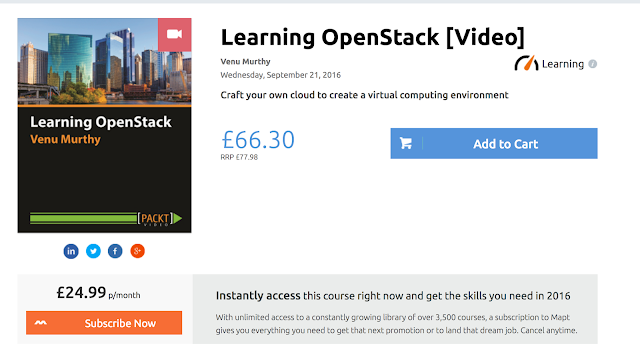Popular posts from this blog
Learning OpenStack - The Easy Way
Dear Friends, Our Dream has come true! It takes 9 months for a mother to bring another life. That is the amount of time it has taken me to demystify the otherwise terse and abstract cloud computing concepts. And thanks to Packt Publishing I for helping me impart this knowledge in the most engaging way. The Full video course is out you can get more details about it here . You can get more details about the course here without registering. The Overview video is out for all. It was a tough negotiation with publisher to give out this valuable video for free I hope that it will get you started on your "Infrastructure as Code" journey. Three points I would like to share, which might help you are:- People are watching us! Packt publishing approached me watching the screencasts I had posted on Youtube. (Which until then I was certain that nobody was watching). Good news is Video course royalty is 3 times that of a book! Bad news is because its 3 times the...
DevOps Training provided by me
Having brought down the environment creation time for Bangalore International Airport Project from three and a half days to 3 hours, all that in one click, I realized that all this was possible due to the magic of "DevOps". I wanted to share my enthusiasm with a wider group and called for applications for DevOps Enablement program. I also wanted it to be an experiment on how successful it would go with non-Developer or non-tech folks and hence opened it up for people from sales as well. To my amazement, they too were able to pick up these skills easily. Below is the feedback from them on their learning experience. Below is the Feedback from the attendees of my DevOps Enablement course. First of all, you are an amazing teacher. I thought I would attend one session, but now I am hooked. Thank you for introducing us to the another side of Ops. In 2 classes you have already managed to answer a lot of questions (cloud, VMs. hypervisors) that have been lingering a...



